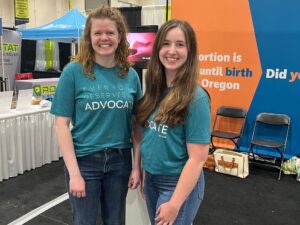Planned Parenthood revenues up
Planned Parenthood’s 2016-2017 annual report shows revenues up while services are down. The abortion giant performed 321,384 abortions in 2016. Since abortion was legalized in 1973, the organization has performed more than 7.6 million. While U.S. abortion numbers have decreased by 23 percent since 2008, Planned Parenthood’s numbers have remained largely stable.
The nation’s largest abortion business showed an 18 percent drop in prenatal care, a four percent drop in pap tests, and a slight drop in pregnancy tests. For every prenatal service given, Planned Parenthood performed 41 abortions; for every adoption referral, the organization performed 83 abortions.
Susan B. Anthony List President Marjorie Dannenfelser explains, “Despite record income, non-abortion services are in decline, clients are abandoning them in droves, and dozens of facilities have closed. Community health centers vastly outnumber (by 20 to 1) Planned Parenthood facilities nationwide and offer comprehensive primary and preventative care for women and families.”
Abby Johnson, former Planned Parenthood manager and founder of And Then There Were None, an organization that reaches out to abortion industry workers, says that the report “demonstrates that Planned Parenthood is not a healthcare organization, but a political movement intent on forcing their pro-abortion views on as many Americans as possible.” [www.lifenews.com/2018/01/04/
FBI and DOJ investigate Planned Parenthood
In 2015, the Center for Medical Progress released videos showing Planned Parenthood executives discussing the sale of aborted baby body parts. Congress began looking into this illegal practice involving abortion providers and fetal procurement businesses. A 1993 federal law allows abortion providers to give remains from abortions to researchers, but not profit from the transactions. Congressional panels found that middleman businesses were buying fetal brains, hearts, lungs, and livers from abortion providers and selling them at a 400 percent profit.
Following the videos’ release, Senator Chuck Grassley, chairman of the Senate Judiciary Committee requested a criminal investigation of Planned Parenthood. Grassley’s committee and the House Select Investigative Panel on Infant Lives reviewed more than 20,000 pages of documents provided by Planned Parenthood and concluded that the organization was engaging in “systematic” violations of federal law and referred Planned Parenthood for criminal investigation. Planned Parenthood calls the accusations “baseless.”
Signaling a wider probe into the abortion industry, the FBI requested unredacted documents the Senate Judiciary Committee had obtained in their investigation. Attorney General Jeff Sessions said that if the findings of Congress were confirmed “it could provide a basis for charges.” David Daleiden, founder of the Center for Medical Progress, called the sale of aborted baby body parts “the greatest human atrocity of our times.”
In December 2017, the Justice Department Assistant Attorney General for Legislative Affairs launched a federal inquiry, requesting documents from the U.S. Senate committee. www.lifenews.com/2017/11/14/
Mental health issues following abortion
A new study published in The Journal of American Physicians and Surgeons (Volume 22 Number 4 Winter 2017 113) found that many women experience long-term emotional difficulties following abortion. Bowling Green State University professor, Dr. Priscilla Coleman, asked women about “the most significant positive and negative aspects” of their abortions. Coleman’s study showed that women who had abortions experienced “regret, shame, guilt, depression, anxiety, compromised self-appraisals, and self-destructive behaviors.”
Coleman said that the women’s responses “were far from simple, echoing themes that are not reflective of contemporary feminist rhetoric. Women generally did not speak of empowerment, the ability to control their reproductive destinies, liberation from abusive partners, the need for abortion in order to be competitive in the workplace, etc. To the contrary … many women expressed no personal benefits from the experience. The vast majority of women did not cite only one or two negative outcomes, but instead described a complex constellation of adverse consequences, often centered on the life lost. Scores of others reported spiritual growth, involvement in pro-life efforts, and reaching out to other women who were considering the procedure or had obtained an abortion.”
A significant number of women sought professional mental health services (67.5 percent compared to 13 percent prior to the abortion) and used prescription drugs (51 percent compared to 6.6 percent prior).
Research also revealed that “53 percent of the women reported aborting to make others happy, 73.8 percent disagreed that their decision to abort was entirely free from even subtle pressure from others to abort, 28.4 percent aborted out of fear of losing their partner if they did not abort.”
A new study (Reardon DC, Thorp JM. Sage Open Medicine. Vol 5:1-17, 2017) shows abortion contributes to a 50 percent increased risk of premature death in women. [www.lifenews.com/2018/01/03/
Trump nominations and appointments
As a candidate, Donald Trump promised to nominate a pro-life judge to the U.S. Supreme Court. His greatest judicial accomplishment so far has been Justice Neil Gorsuch’s confirmation to that court, a move widely praised by pro-life advocates. Despite pro-abortion obstruction efforts in the Senate, President Trump is reshaping the judiciary, setting a record for the most circuit court appointments in the first year of any president.
In late October, Amy Coney Barrett was confirmed to the U.S. Court of Appeals for the Seventh Circuit. The pro-life Susan B. Anthony List (SBAL) called Barrett’s confirmation “a victory for the pro-life movement.” In early November, Joan Larsen, also supported by the SBAL, was confirmed to the Sixth Circuit Court of Appeals. Allison Eid was confirmed to the Tenth Circuit Court of Appeals, making her the third female federal appeals court judge nominated by President Trump. In late November, Stephanos Bibas was confirmed to the Third Circuit Court of Appeals. Greg Katsas, supported by the SBAL, was confirmed to the D.C. Court of Appeals. In December, the Senate approved Steve Grasz to the U.S. Court of Appeals for the Eighth Circuit. Grasz defended Nebraska’s ban on partial-birth abortion before the Supreme Court. Planned Parenthood opposed Grasz’ confirmation. Kyle Duncan, Trump’s nominee for the Fifth Circuit Court of Appeals is receiving strong support from pro-life groups. Duncan represented Hobby Lobby before the Supreme Court in its challenge to Obama’s mandated contraceptive coverage.
In appointments outside the judicial system, President Trump’s selection for Health and Human Services secretary, Alex Azar, was approved by the Senate in January. Azar believes the HHS should consider conscience issues for those who don’t want forced abortion funding in their employee health insurance and has called Obamacare a “fundamentally broken system.” SBAL says Azar will lead the way in implementing Trump’s pro-life policies. The Senate also approved Kansas governor Sam Brownback for Ambassador at Large for International Religious Freedom. Brownback has a long, consistent pro-life record. [http://www.lifenews.com/2018/
National, Oregon abortion numbers at all-time low
Centers for Disease Control (CDC) abortion numbers for 2014, the most recent year available, show that abortion numbers have dropped to levels not seen since the early 1970s. Abortionists reported performing 652,639 abortions in 2014, a two percent drop from 664,434 abortions in 2013. Over the last decade, abortion numbers are down 21 percent. Teen abortions are down nearly 50 percent.
Both abortion rates (number of abortions per 1,000 women of reproductive age) and ratios (number of abortions for every 1,000 live births) are at their lowest since the Supreme Court legalized abortion in 1973. Chemical (RU 486) abortions now make up nearly one-quarter of all procedures.
Oregon’s 2014 numbers are also at an all-time low according to the Oregon Health Authority 2014 Vital Statistics Report, mirroring the national trend. There were 7,956 abortions in Oregon in 2014, a 2.5 percent drop from the 8,159 abortions in 2013. The 2014 numbers are about half of the high of 15,585 abortions recorded in 1980. Oregon numbers for 2015 and 2016 inched up a bit, but it’s unknown whether national numbers for those years will tell the same story.
It can be difficult to determine factors that contribute to these numbers. However, in its analysis, the CDC does acknowledge that pro-life efforts have contributed, including regulations such as mandatory waiting periods, parental involvement laws, and restrictions on abortion providers. Pro-lifers believe that education regarding the humanity of the unborn child and offering alternatives to abortion have contributed. [www.lifenews.com/2017/11/22/





